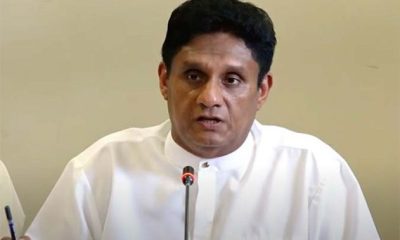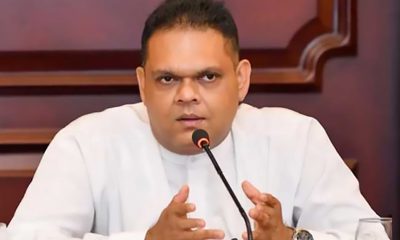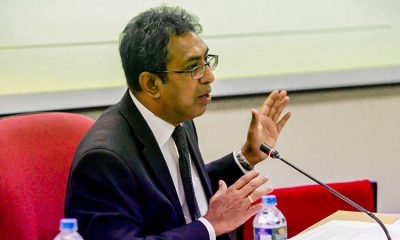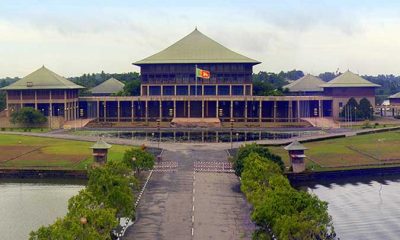News
Wide-ranging proposals on judicial & legal reforms from SJB Lawyers Federation to Sajith
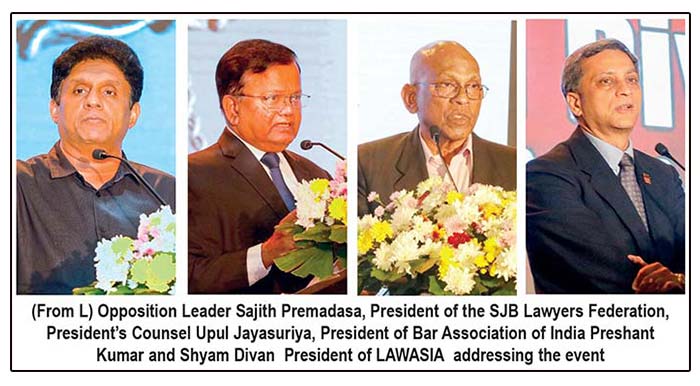
President of the SJB Lawyers Federation, President’s Counsel Upul Jayasuriya, last week handed over a set of 116 proposals itemized as “Legal Reforms for System Change” to Opposition and SJB Leader Sajith Premadasa during a lawyers’ convention held at Jayewardenepura with the participation of over 1,000 lawyers and senior counsel.
Jayasuriya who is the head of the Samagi Lawyers Federation said that they propose these new resolutions as a legal basis for system change in the future.
The following are some of the key proposals: 1) President to be required to engage in a consultative process with stakeholders prior to making judicial appointments. Views emerging through such consultation to be conveyed to the Constitutional Council along with the name/s nominated for their approval.
2) There shall be a Constitutional Court. Retirement age of the judges in that court shall be higher than the Judges of the Supreme Court. All appointments to the Constitutional Court, Supreme Court and Court of Appeal, the Members of the Judicial Service Commission other than the Chairman, shall be made by the President on the recommendation of the Constitutional Council.
3) In the discharge of its function relating to the appointment of the President and Judges of the Constitutional Court, Judges of the Supreme Court and the President and Judges of the Court of Appeal, the Constitutional Council shall obtain the views of the Chief Justice and the two senior-most Judges of the Supreme Court.
4) A more transparent criterion will be proposed for judicial appointments. Including a collegiate system to recommend, based on transparent criteria.
Selection of High Court Judges should be by a mixed and eminent panel consisting of most senior President’s Counsel, Attorney General, President BASL, President Court of Appeal presided over by the Chief Justice. Under normal circumstances the age limits will be as stipulated.
5) Allegations of misbehaviour or incapacity contained in a resolution in the House of Representatives for the presentation of an address for the removal of a Judge of the Constitutional Court, Supreme Court or Court of Appeal shall be inquired into by a panel consisting of three retired Judges of the Constitutional Court or the Supreme Court. Such a panel shall be appointed by the Speaker on the recommendation of the Constitutional Council.
Parliament shall by law provide for all matters relating to the presentation of such an address, including the procedure for the passing of such resolution, the investigation and proof of the alleged misbehavior or incapacity and the right of such Judge to appear and to be heard in person or by a representative. Where the panel determines that the allegations of misbehaviour or incapacity contained in the resolution are not proved, the resolution shall lapse.
6) There shall be a Code of Conduct applicable to Judges of the Constitutional Court, Supreme Court and Court of Appeal. Allegations of serious infractions of the Code of Conduct with negative implications for the Judiciary’s independence, integrity and public trust shall be inquired into by a panel consisting of three retired Judges of the Constitutional Court or the Supreme Court appointed by the President on the recommendation of the Constitutional Council. The panel shall submit its report to the President and the Constitutional Council for appropriate action.
7) All judges of the Court of Appeal and the Supreme Court shall be entitled to enjoy the same salary, same facilities and benefits until death, maintaining total independence of the Judiciary, economically and otherwise. However they shall not hold other offices except that are prescribed by Law.
8) The Court of Appeal to be decentralized (to sit like the Courts of Assize) to take the Appeal Court closer to the people. Senior President’s counsel and President BASL to be consulted in appointing temporary judges
9) The Court of Appeal shall conduct its sittings in each Province. It shall have an original fundamental rights and language rights jurisdiction. An appeal shall lie to the Supreme Court with leave from the Court of Appeal or special leave from the Supreme Court. The civil appellate jurisdiction of the Provincial High Courts shall be transferred to the Court of Appeal sitting in the provinces.
10) In the case of special courts such selected persons should be over the age of 62 years and below the age of 75 years. They should be selected from among retired High Court Judges with a proven track record. Only thereafter the President shall recommend such names to the Constitutional Council.
11) All judicial promotions shall be considered on the basis of completion of the ongoing cases and the delivery of orders and judgements and number of such cases sustained in the appellate court.
12) All judgments of court shall be complied immediately. In instances wherein frivolous appeals have been lodged by the state and damages along with legal interest has accumulated unconscionably, such officers shall be held personally liable for such enhanced damages.
13) A law relating to contempt of courts on the lines of Indian statute shall be passed.
14) The Office of the Attorney-General shall be an independent entity. The Attorney-General shall be the Chief Legal Officer of the Republic and shall uphold and safeguard the sovereignty of the People. It should be ensured that the Attorney General will hold the scales of justice evenly maintaining the highest traditions of the office of Attorney General without being a mouthpiece of the regime in power, in particular issuing certificates on draft legislation.
15) An independent Office of Public Prosecutor shall be set up by law.
16) An independent Office of the Public Defender shall be set up by law.
17) The Attorney-General, Chief Public Prosecutor and Public Defender shall be appointed by the President on the recommendation of the Constitutional Council.
18) Consider the feasibility and scope to recruit external lawyers to the AG’s Department at all levels based on objective criteria calculated to promote better competence and integrity. However, those internal candidates would be given due consideration.
19) Any appointee to the post of Attorney General or the Solicitor General shall not hold office in excess of three years.
20) Delays in serving indictments should be curtailed. All indictments should be filed within three months or the most six months of the alleged crime. In order to complete the backlog, private Lawyers should be hired under the supervision of the AG. Allocation and coordination of such cases will be conducted by a decentralised public prosecutor.
21) In order to curtail delays in trials no postponement shall be granted on the basis that the Lawyer is in another court as is the practice in Indian Courts. This will also give more opportunities to younger Lawyers.
22) Consider timeframes for expeditious conclusion, such as if a criminal trial isn’t completed within a given time span, day to day trials should be held. The right to bail to be enhanced where prosecution isn’t commenced within a determinate time frame.
News
US sports envoys to Lanka to champion youth development

The U.S. Embassy in Colombo welcomed the U.S. Sports Envoys to Sri Lanka, former National Basketball Association (NBA) and Women’s National Basketball Association (WNBA) players Stephen Howard and Astou Ndiaye, from June 8 through 14.
The Public Diplomacy section of the U.S. Embassy said that it would launch a weeklong basketball program intended to harness the unifying power of sports, made possible through collaboration with Foundation of Goodness and IImpact Hoop Lab.
While in Sri Lanka, Howard and Ndiaye, both retired professional basketball players, will conduct a weeklong program, Hoops for Hope: Bridging Borders through Basketball. The Sports Envoys will lead basketball clinics and exhibition matches and engage in leadership sessions in Colombo and Southern Province for youth aged 14-18 from Northern, Uva, Eastern and Western Provinces, offering skills and leadership training both on and off the court. The U.S. Envoys will also share their expertise with the Sri Lanka Basketball Federation, national coaches, and players, furthering the development of basketball in the country. Beyond the clinics, they will collaborate with Sri Lankan schoolchildren to take part in a community service project in the Colombo area.
“We are so proud to welcome Stephen and Astou as our Sports Envoys to Sri Lanka, to build on the strong people-to-people connections between the United States and Sri Lanka,” said U.S. Ambassador Julie Chung. “The lessons that will be shared by our Sports Envoys – communication, teamwork, resilience, inclusion, and conflict resolution – are essential for leadership development, community building, equality, and peace. The U.S. Sports Envoy program is a testament to our belief that sports can be a powerful tool in promoting peace and unity.”
News
Rahuman questions sudden cancellation of leave of CEB employees

SJB Colombo District MP Mujibur Rahuman in parliament demanded to know from the government the reasons for CEB suspending the leave of all its employees until further notice from Thursday.
MP Rahuman said that the CEB has got an acting General Manager anew and the latter yesterday morning issued a circular suspending leave of all CEB employees with immediate effect until further notice.
“We demand that Minister Kanchana Wijesekera should explain this to the House. This circular was issued while this debate on the new Electricity Amendment Bill was pending. There are many who oppose this Bill. The Minister must tell parliament the reason for the urge to cancel the leave of CEB employees,” the MP said.However, Speaker Mahinda Yapa Abeywardena prevented Minister Wijesekera responding to the query and said that the matter raised by MP Rahuman was not relevant.
News
CIPM successfully concludes 8th Annual Symposium

The Chartered Institute of Personnel Management (CIPM) successfully concluded the 8th Annual CIPM Symposium, which took place on 31st May 2024. Themed “Nurturing the Human Element—Redefining HRM in a Rapidly Changing World,” the symposium underscored the pivotal role of human resource management (HRM) in today’s dynamic global landscape. Since its inception in 1959, CIPM has been dedicated to advancing the HR profession through education, professional development, and advocacy, solidifying its position as Sri Lanka’s leading professional body for HRM.
Ken Vijayakumar, the President of the CIPM, graced the occasion as the chief guest. The symposium commenced with the welcome address by the Chairperson, Prof. Arosha Adikaram, followed by the Web Launch of the Symposium Proceedings and Abstract Book by the CIPM President. The event featured distinguished addresses, including a speech by Chief Guest Ken Vijayakumar, President of CIPM, and an address by Guest of Honor Shakthi Ranatunga, Chief Operating Officer of MAS Holdings Pvt. Ltd., Sri Lanka.
The symposium also featured an inspiring keynote address by Prof. Mario Fernando, Professor of Management and Director of the Centre for Cross Cultural Management (CCCM) at the University of Wollongong, Australia.
Vote of Thanks of the inauguration session was delivered by Dr. Dillanjani Weeratunga, Symposium Co-chair.
The symposium served as a comprehensive platform for researchers to present their findings across a wide range of critical topics in HRM. These included Cultural Diversity and Inclusion, Talent Development and Retention, Ethical Leadership and Corporate Social Responsibility, Adapting to Technological Advancements, Mental Health and Well-being at Work, Global Workforce Challenges, Employee Empowerment, and Reskilling and Upskilling.
The plenary session was led by Prof. Wasantha Rajapakse. Certificates were awarded to the best paper presenters during the valedictory session, followed by a vote of thanks delivered by Kamani Perera, Manager of Research and Development.
The annual symposium of CIPM was a truly inclusive event, attracting a diverse audience that spanned undergraduates, graduates, working professionals, research scholars and lecturers. This widespread interest highlights the symposium’s significance in the field of HRM, offering a unique opportunity for everyone to network and learn from scholarly brains.The CIPM International Research Symposium was sponsored by Hambantota International Port, Sri Lanka Institute of Information Technology (SLIIT), E B Creasy & Co. PLC, and Print Xcel Company.


